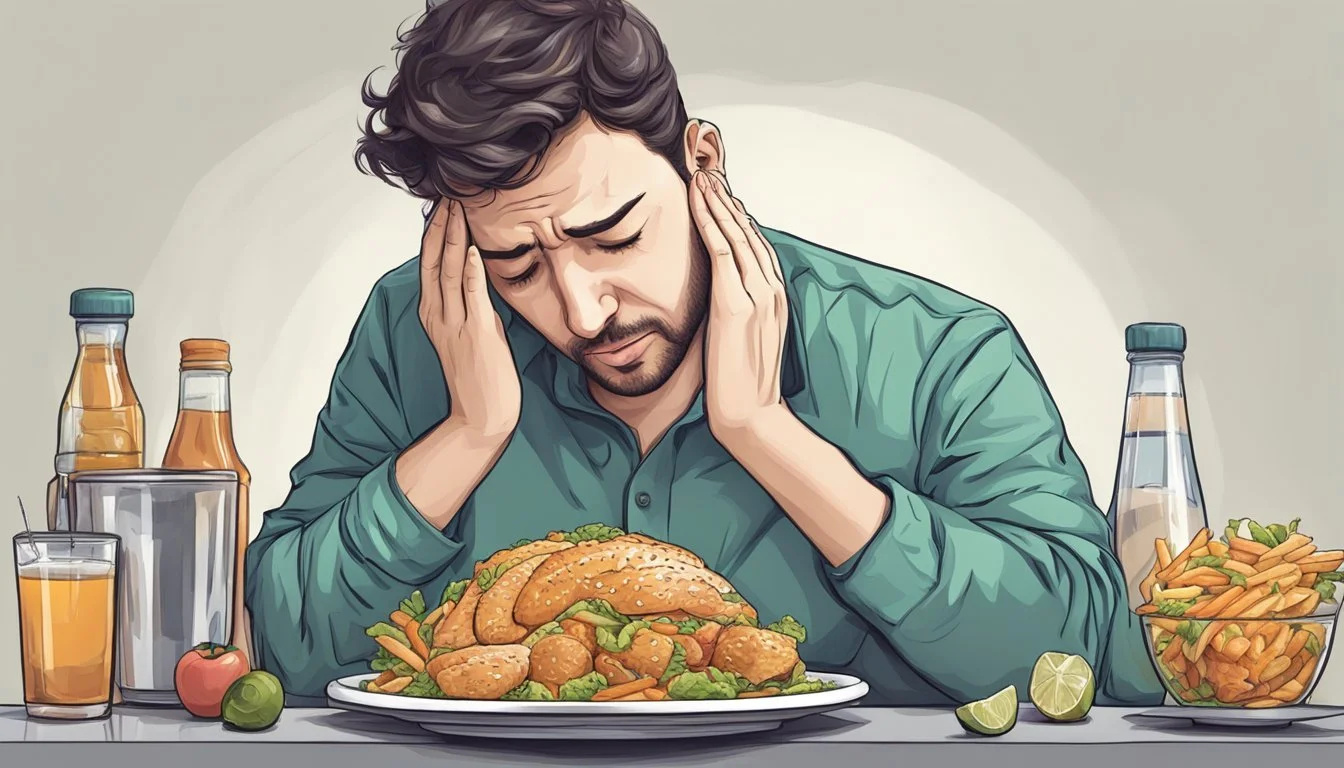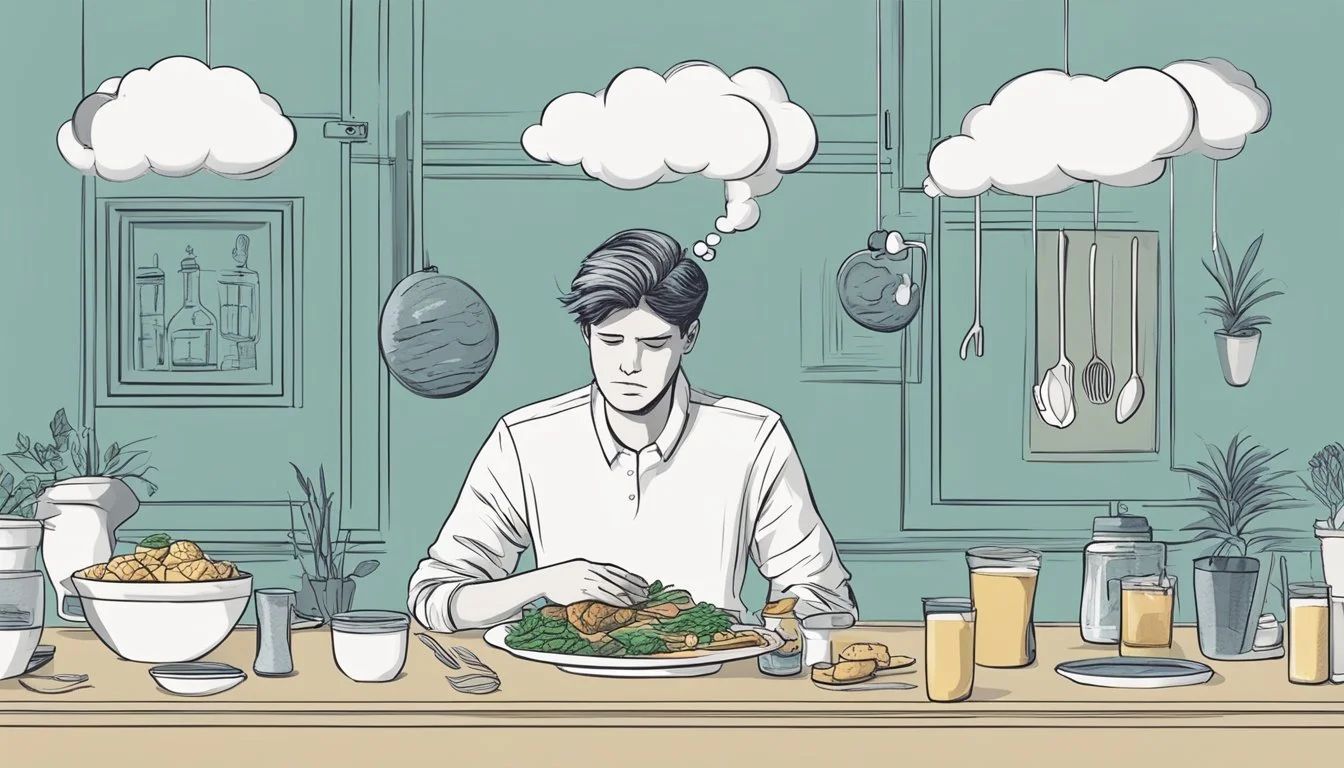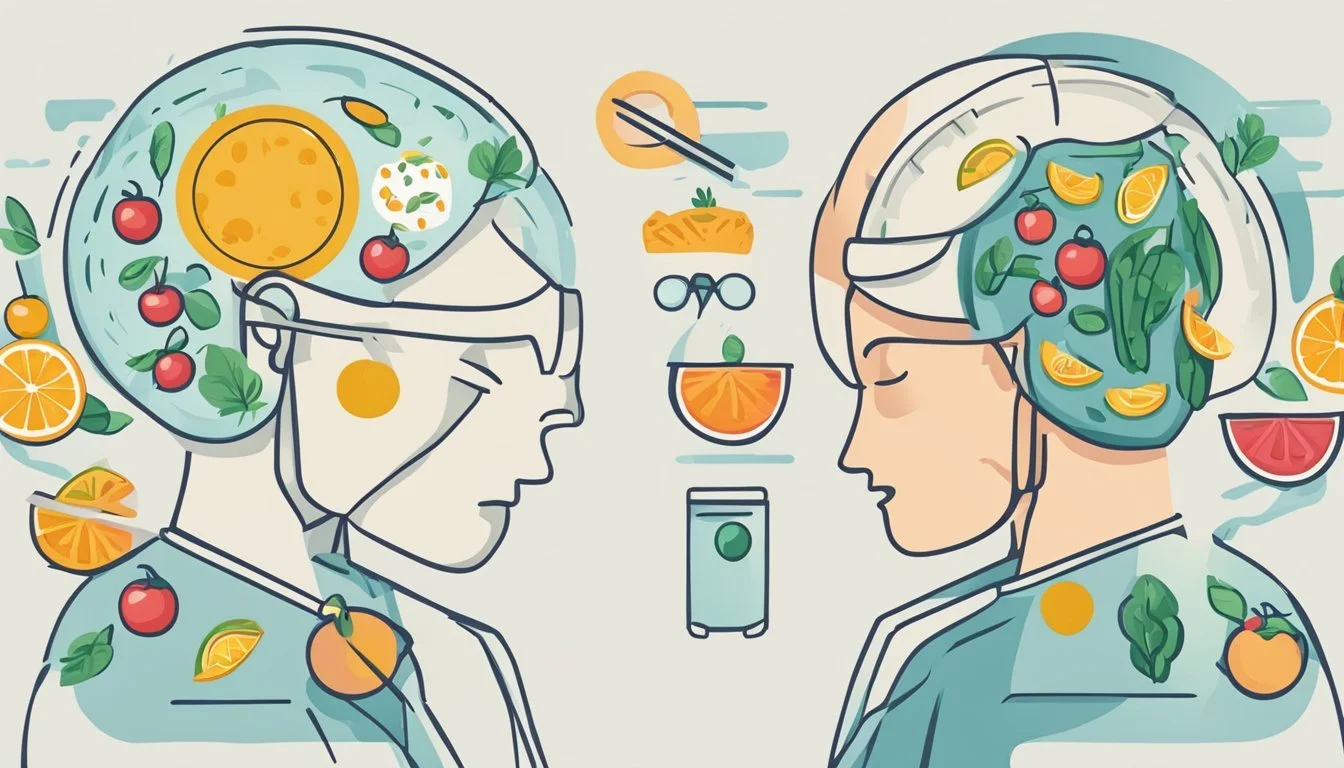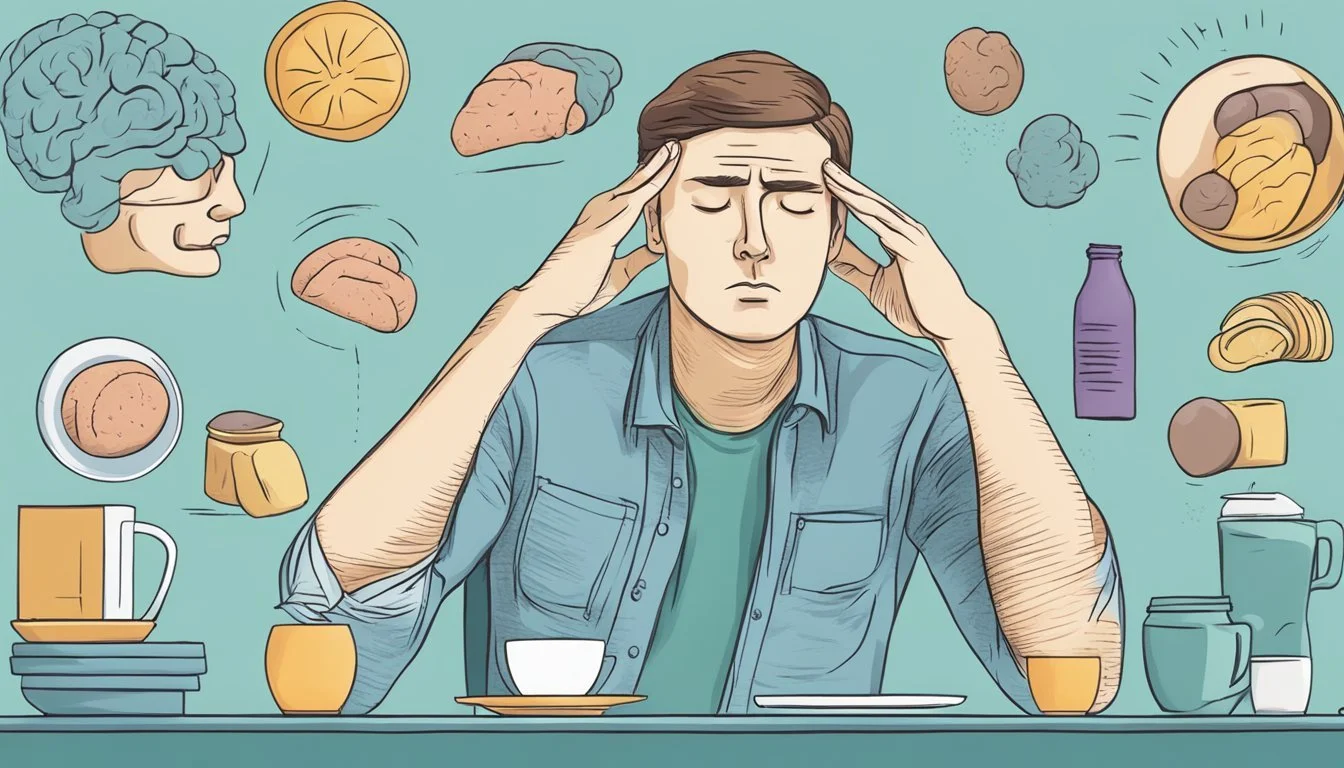Headaches After Eating
Causes and Solutions
Discover > Healthy Living Through Food > Headaches After Eating
Headaches after eating can be a distressing experience for many individuals. This phenomenon can occur for a variety of reasons and understanding the potential causes is key to finding relief. In some cases, headaches after consuming food or beverages may be related to specific ingredients, while in others, they may stem from how the food was prepared or changes within the body.
One common cause of post-meal headaches is the presence of certain food triggers, such as additives, preservatives, or natural compounds. Examples include monosodium glutamate (MSG), nitrates, artificial sweeteners, and even caffeine. Similarly, dehydration, low blood sugar (how long does sugar last?) levels, or changes in blood pressure can also lead to headaches after eating. Identifying and avoiding these triggers may alleviate the issue for some people.
In addition to food triggers, certain medical conditions can cause headaches after eating. Such conditions could include allergies, diabetes, or digestive disorders. Consulting a healthcare professional for proper diagnosis and treatment is crucial if headaches persist or worsen after meals. By addressing the root cause, it is possible to reduce the frequency and severity of these post-meal headaches.
Understanding Headaches After Eating
Headaches after eating can be a common occurrence for some individuals. They can be caused by various factors, ranging from food choices to underlying medical conditions. Understanding the potential causes can help individuals find relief and prevent future headaches.
One factor contributing to headaches after eating is food sensitivity or allergies. Certain foods such as chocolate, aged cheese, citrus fruits, and processed meats contain chemicals that can trigger headaches in some people. Identifying and avoiding these trigger foods can help reduce the frequency of headaches.
Another possible reason for headaches after eating is changes in blood sugar levels. Both low and high blood sugar can cause headaches and discomfort. Consuming balanced meals with healthy mix of carbohydrates, proteins, and fats can help regulate blood sugar levels and prevent headaches.
Additionally, dehydration can lead to headaches after eating. Drinking enough water throughout the day is essential for maintaining proper hydration and preventing headaches. It is recommended that individuals aim for eight 8-ounce glasses of water a day.
In some cases, headaches after eating may be a symptom of an underlying medical condition, like migraine or hypertension. If headaches persist despite dietary changes and proper hydration, it is advisable for individuals to consult their healthcare provider for further evaluation and appropriate treatment.
To summarize, headaches after eating can be attributed to food sensitivities, blood sugar fluctuations, dehydration, or underlying medical conditions. Identifying the cause and making appropriate adjustments can help alleviate and prevent future occurrences of headaches after eating.
Possible Causes of Post-meal Headaches
There are several factors that may contribute to headaches after eating. One possible cause is the fluctuation of blood sugar levels. When a person consumes carbohydrates, their body produces insulin, which can cause blood sugar levels to drop suddenly. This condition, known as reactive hypoglycemia or postprandial hypoglycemia, can lead to headaches, shakiness, and stomach pain.
Food intolerance and allergies can also trigger post-meal headaches. Certain foods, such as dairy and gluten, are common allergens that may cause inflammation in some individuals. People with celiac disease or gluten sensitivity may experience headaches after consuming foods containing gluten. Similarly, food additives like monosodium glutamate (MSG) and aspartame sweetener can cause adverse reactions in sensitive individuals, resulting in headaches.
Another factor related to food-induced headaches is the presence of specific compounds in certain foods. Tyramine, found in aged cheese, pickles, and some alcoholic beverages, can trigger headaches in susceptible individuals. Nitrates and nitrites, commonly found in processed meats, can also cause headaches due to their effects on blood vessels.
Hydration plays a critical role in overall health, and dehydration can trigger headaches. Alcohol consumption can cause dehydration, leading to headaches after a meal that includes alcoholic beverages. It's essential to maintain adequate hydration by drinking sufficient water throughout the day.
In some cases, headaches may be related to a phenomenon called "brain freeze" or "cold stimulus headache." Consuming cold foods and beverages rapidly, such as ice cream or cold drinks, can cause a brief, intense headache due to a rapid constriction of blood vessels in the head.
People with temporomandibular joint (TMJ) disorder may experience headaches after eating due to strain on jaw muscles during chewing. Foods that require more effort to chew, such as tough meats and raw vegetables, may exacerbate this issue.
In conclusion, post-meal headaches can have various causes, including fluctuations in blood sugar levels, food intolerance and allergies, specific food compounds, dehydration, and physiological factors like TMJ disorder. Identifying and addressing the specific trigger can help prevent headaches after eating.
Identifying Migraines and Food Allergies
When dealing with headaches after eating, it is important to identify whether these are caused by migraines or food allergies. Migraine attacks may be triggered by specific food items, while food allergies may result in headaches along with other symptoms. Understanding the difference between the two will help in effectively managing the pain and discomfort.
Migraines are a type of headache characterized by a pulsating or throbbing sensation, often accompanied by nausea, vomiting, and sensitivity to light or sound. In some cases, individuals may experience migraines after eating certain foods. Common food triggers include aged cheeses (What wine goes well with aged cheeses?), beans, yogurt, red wine, and foods containing high levels of the amino acid tyramine. To manage migraines, one can take over-the-counter pain relievers such as nonsteroidal anti-inflammatory drugs (NSAIDs) or acetaminophen. In more severe cases, prescription medication like triptans may be prescribed.
Food allergies, on the other hand, occur when the body's immune system reacts negatively to specific food proteins. Headaches caused by food allergies are often accompanied by additional symptoms such as nausea, vomiting, and diarrhea. Some common food allergens include dairy products, nuts (how long do nuts last?), shellfish, and wheat. To identify the cause of a food allergy, an elimination diet may be recommended. Such a diet involves removing the suspected allergen from one's daily meals followed by a gradual reintroduction to identify the trigger.
In both cases, individuals must pay attention to their diets and monitor their reactions to different foods. By identifying migraine or food allergy triggers, one can modify their eating habits to prevent headaches after eating. It is crucial to consult with a healthcare professional for guidance and to determine the appropriate treatment method for each individual's specific needs.
The Role of Hydration and Dietary Habits
Proper hydration plays a significant role in the prevention of headaches after eating. Dehydration often leads to a reduced volume of blood, which can result in the constriction and dilation of blood vessels, triggering headaches. Staying adequately hydrated proves essential for preventing hunger headaches and ensuring optimal brain function.
In addition to hydration, dietary habits also influence the occurrence of headaches. One common example is caffeine withdrawal headaches. Consuming caffeine regularly, through coffee or other sources, causes the person to become dependent on it. Withdrawal from caffeine often triggers headaches, as the body adjusts to the change.
Minding one's eating habits can also prevent hunger headaches. Fasting for long periods or consuming inadequate meals can cause blood sugar levels to drop, leading to headaches. Maintaining a regular eating schedule with balanced meals and healthy snacks can help curb these fastings induced headaches.
Moreover, fluctuating caffeine intake should be taken into account. For individuals accustomed to high caffeine consumption, sudden cessation might lead to withdrawal symptoms, including headaches. Gradually reducing caffeine intake over time can help alleviate the severity of these headaches.
To summarize:
Stay adequately hydrated
Monitor caffeine consumption
Maintain a regular eating schedule
Gradually reduce caffeine intake if needed
By considering these factors, one can minimize the frequency of headaches after eating and contribute to improved overall health.
Medical Conditions and Post-meal Headaches
Headaches after eating can be caused by various medical conditions. One common cause is hypoglycemia, which occurs when blood sugar levels drop too low. This can happen if someone has diabetes or is taking medications that lower blood sugar. Diabetic individuals should monitor their blood glucose levels and adjust their treatment plan accordingly to avoid headaches and other hypoglycemia symptoms.
Another possible reason for headaches after eating is tension headaches. These are often triggered by stress, muscle strain, or poor posture. Tension headaches can be exacerbated by certain foods, such as those high in caffeine or additives like monosodium glutamate (MSG). Reducing the consumption of these trigger foods may alleviate tension headaches.
Temporomandibular joint disorders (TMJ disorders) are a less common but still possible cause of post-meal headaches. TMJ disorders involve issues with the jaw and the muscles controlling jaw movement. Sufferers may experience pain in their jaw, face, or head, which could be aggravated by chewing or eating. To relieve TMJ-associated headaches, one may benefit from conservative treatments such as over-the-counter pain relievers, jaw stretching exercises, and stress management techniques.
In conclusion, hypoglycemia, tension headaches, and TMJ disorders are just a few examples of medical conditions that can lead to headaches after eating. Managing these conditions through proper self-care, diet, and treatment can help individuals reduce the frequency and intensity of their post-meal headaches, improving their overall quality of life.
Treatment and Prevention
When experiencing headaches after eating, several treatments and preventions can be considered to alleviate the symptoms. One common solution is taking over-the-counter medications, such as ibuprofen or naproxen, which are effective pain relievers. However, it is crucial to consult a healthcare professional before using any medications to avoid adverse effects.
In addition to medications, alternative therapies can be explored to treat headaches after eating. Practices such as meditation and acupuncture have been known to provide relief for many individuals. These techniques can help lessen the intensity of headaches and provide relaxation during episodes.
Applying a cold compress to the area where the headache is felt may also provide relief. The cooling sensation can help reduce pain, making it a practical and non-invasive solution. For those experiencing dizziness and shakiness during headaches, it is essential to rest, drink water, and avoid any excessive physical activity to prevent further complications.
Incorporating certain vitamins and herbal supplements into one's daily routine can be beneficial in preventing headaches. Some of these include magnesium, riboflavin, and coenzyme Q10. As with medications, it is important to consult a healthcare professional before using any supplements to ensure safety and compatibility.
Maintaining a healthy, balanced diet is a crucial factor in preventing headaches after eating. Identifying and avoiding food triggers, such as processed foods, artificial sweeteners, and caffeine, can help minimize the occurrence of headaches. Proper hydration is also essential in preventing headaches, so be sure to drink enough water throughout the day.
For individuals suffering from chronic headaches after eating, it is recommended to seek advice from a healthcare professional. They can assess one's situation, offer proper treatment, and potentially recommend further testing to identify the root cause of the issue. By following the appropriate guidance and recommendations, individuals can better manage and prevent headaches after eating.
Conclusion
Headaches after eating can be unpleasant but are often preventable. Identifying the primary causes, such as food triggers, dehydration, and low blood sugar, can significantly reduce their frequency. Maintaining a balanced diet and staying properly hydrated are essential steps in managing this issue.
Food Triggers: Some common food triggers include:
Aged cheese
Caffeine
Alcohol
Additives like monosodium glutamate (MSG)
Processed meats
Chocolate
If headaches persist, keeping a food diary can help identify specific triggers to eliminate from the diet.
Dehydration: Ensuring adequate water intake through the day can mitigate headaches caused by dehydration. The recommended daily water consumption is:
Men: 3.7 liters (13 cups)
Women: 2.7 liters (9 cups)
Low Blood Sugar: To avoid headaches due to low blood sugar, consume regular meals and healthy snacks that include a balance of:
Carbohydrates
Proteins
Fats
Additionally, avoid delaying or skipping meals if possible.
In conclusion, understanding the various factors that contribute to headaches after eating and implementing appropriate lifestyle changes can significantly alleviate this issue. However, if headaches persist or worsen, consulting a healthcare professional is recommended.
Frequently Asked Questions
Why do I feel headaches after consuming sugar?
Headaches after consuming sugar can be triggered by a sudden increase in blood sugar levels, which can cause blood vessels to constrict and result in a headache. This is more common in people who have diabetes or are sensitive to changes in their glucose levels. Another possible cause is a sugar withdrawal when one goes without sugar for a period before consuming it again.
What causes sinus headaches after eating?
Sinus headaches after eating can be caused by changes in air pressure or temperature, leading to sinus congestion. Some people may have food sensitivities that trigger sinus inflammation, such as an allergy to dairy products. In these cases, avoiding the triggering foods could help alleviate sinus headaches.
Is a headache after eating oily food common?
Headaches after eating oily foods can result from indigestion or other gastrointestinal discomfort. Greasy foods can also cause blood vessels in the head to constrict, leading to headaches. Individuals with conditions like irritable bowel syndrome (IBS) or reflux may be more susceptible to headaches triggered by oily foods.
How can pregnancy trigger headaches after eating?
Pregnant women may experience headaches after eating due to hormonal fluctuations or changes in blood pressure. Gestational diabetes could also contribute to post-meal headaches, as it may cause blood sugar levels to become unstable. Maintaining a balanced diet and staying well-hydrated can help prevent headaches during pregnancy.
Can eating certain types of meat lead to headaches?
Consumption of certain types of meat can lead to headaches. For example, some processed meats contain nitrates, preservatives that can cause blood vessels to dilate and increase the risk of headaches. People with sensitivities to nitrates or other food additives should limit their intake of processed meats to minimize headaches.
Why do I experience headaches after eating rice?
Headaches after eating rice (how long does rice last?) might be due to a food sensitivity, such as an intolerance to gluten, which is found in certain types of rice. Rice can also cause a rapid increase in blood sugar levels, which may trigger headaches in some people. To prevent headaches caused by rice, choose whole-grain rice varieties that have a lower glycemic index, or opt for alternative grains like quinoa (how long does quinoa last?) or bulgur (how long does bulgur last?).







